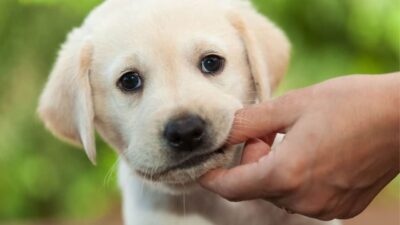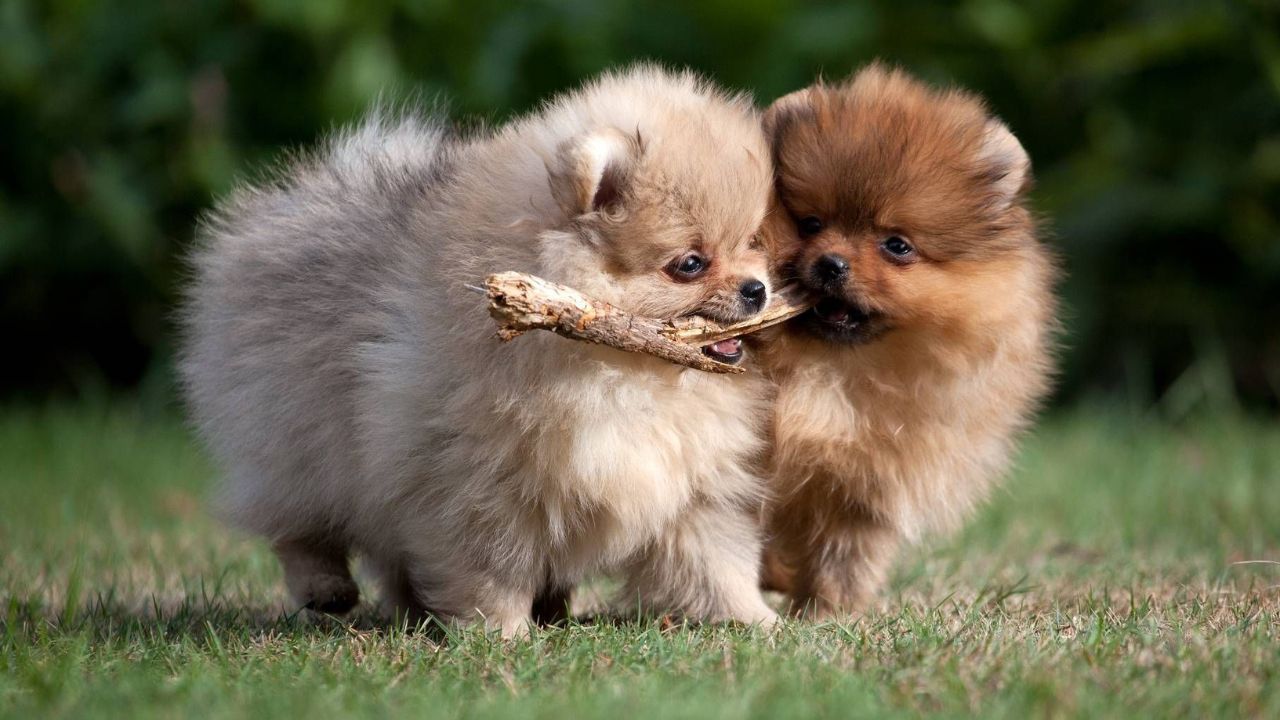Pomeranian puppies are adorable bundles of energy and curiosity. However, one common challenge many owners face is dealing with their biting behavior You’ve come to the right site if you’ve been wondering how to stop this habit and maintain a positive relationship with your pet. This thorough article will review many methods to get your Pomeranian puppy to quit biting
Knowledge about Pomeranian Puppies
Pomeranian puppies are famous for their spirited and playful demeanor. During their puppyhood, they exhibit a natural inclination to explore their surroundings by using their mouths. This behavior is completely normal and is driven by their innate instincts. Just like human infants, Pomeranian puppies undergo a phase where they are teething, and chewing helps alleviate the discomfort in their gums. Therefore, if you find your Pomeranian puppy constantly nibbling or mouthing objects, rest assured that it’s a typical behavior for their age. Providing them with appropriate chew toys and gentle guidance can help redirect their chewing behavior positively.

Reasons Behind Puppy Biting
Teething
Puppies, including Pomeranians, undergo a teething phase similar to human infants. During this period, they may chew on their hands and feet to comfort themselves from the soreness in their gums.
Exploration and Play
Biting allows puppies to interact with their environment and engage in play. Pomeranian puppies, in particular, are curious creatures and may use their mouths to investigate objects and people around them.
Attention-Seeking Behavior
Some puppies resort to biting to get attention from their owners. They may learn that biting elicits a positive or negative response and continue the behavior as a way to interact with you.
Risks of Ignoring Biting Behavior
Neglecting or minimizing biting behavior in Pomeranian puppies can pose significant risks. This behavior isn’t just a passing phase; it can result in discomfort or harm to humans and other animals. Furthermore, if left unaddressed, it may solidify into aggressive habits that endure into adulthood. Puppies learn through repetition and reinforcement, so ignoring their biting may inadvertently reinforce the behavior. To provide a secure and peaceful atmosphere for all parties, it is imperative to address biting behavior as soon as it occurs through appropriate training and redirection methods.

Techniques to Stop Biting
Socialization and Training
Early socialization and training are crucial for teaching your Pomeranian puppy appropriate behavior. Expose it to various environments, people, and animals to help it learn to interact positively without biting.
Redirecting Attention
When your puppy starts biting, redirect its attention to a more appropriate chew toy or activity. This teaches it what is acceptable to chew on and provides an outlet for its natural chewing instincts.
Positive Reinforcement
Give toys, snacks, or praise for good behavior. Encouraging behavior is reinforced and makes your puppy more aware of your expectations.
Consistency in Training
Maintaining consistency is crucial when training your Pomeranian puppy. Your puppy can grow and learn in a structured environment if you establish clear rules and boundaries and make sure everyone in the home follows them. Consistency prevents confusion and reinforces the behaviors you desire to instill in your furry friend. Whether it’s obedience training, potty training, or curbing unwanted behaviors like biting a consistent approach lays the foundation for success. Remember, consistency helps your puppy understand expectations and strengthens the bond between you and your pet.
Patience and Persistence
Developing desirable behaviors in your Pomeranian puppy requires both patience and persistence. It’s important to understand that behavior change doesn’t happen overnight, especially in young pups. Embrace each small progress as a victory and remain patient throughout the process. By consistently applying training methods and providing positive reinforcement, you lay the groundwork for long-term success. Recall that each puppy develops at their rate, so it’s critical to maintain commitment and resist giving up in the face of obstacles. As your puppy develops into a well-mannered friend, you’ll be able to see the fruits of your labor with patience, commitment, and lots of love.
Avoiding Punishment
Using punishment as a means to correct your puppy’s biting behavior can backfire and worsen the issue. Punishment may lead to fear or anxiety in your puppy, and it doesn’t effectively teach them what behavior is desired. Instead of punishment, prioritize positive reinforcement and redirection techniques. Remind your dog to stop biting and distract them with a chew toy or another activity. When they behave appropriately, give them snacks or praise. By emphasizing positive reinforcement, you may build a stronger bond with your puppy and encourage them to repeat positive behaviors. This method creates a caring and encouraging atmosphere ideal for learning and development.
Seeking Professional Help
If you struggle to manage your Pomeranian puppy’s biting behavior, don’t hesitate to seek assistance from a professional. A certified trainer or behaviorist possesses the expertise to offer tailored guidance and support, addressing your unique concerns effectively. They can do a thorough behavioral assessment of your puppy and create a personalized training schedule to deal with the biting problem. Hiring a professional assures that you get knowledgeable guidance and support when dealing with difficult behavioral problems, resulting in a happy and harmonious bond between you and your cherished pet. It’s a proactive move to ensure your puppy’s well-being and peace of mind, so don’t be reluctant to ask for help.
Supervision and Management
To prevent biting incidents, close supervision is essential, particularly during your puppy’s playtime. Stay vigilant and intervene immediately if you notice any signs of biting behavior. Employ management tools such as baby gates or crates to create a safe environment and minimize opportunities for biting. These tools help prevent situations where biting may occur, allowing you to redirect your puppy’s attention to more appropriate activities. You may cultivate a harmonious relationship with your furry friend and encourage healthy behavior in your puppy by taking proactive measures to manage their surroundings and interactions. Recall that effective management and prevention of biting behavior depend on proactive supervision.
Providing Chew Toys
Ensure your puppy has access to diverse chew toys tailored to their needs. These toys serve a dual purpose: soothing your puppy’s teething discomfort and fulfilling their innate desire to chew and gnaw. Opt for toys specifically designed for puppies, which are safe and durable for their delicate mouths. You offer your puppy stimulating and engaging options to explore by providing a range of textures and shapes. Remember to rotate the toys regularly to keep your puppy’s interest piqued. With an array of enticing chew toys, your puppy can satisfy their chewing instincts while sparing your furniture and belongings from their teething tendencies.
Exercising Regularly
Regular exercise is essential for your Pomeranian’s overall well-being. Involve them in various mental and physical exercises to help them release extra energy and clear their minds. Take them for daily walks to explore the outdoors and provide mental stimulation. Incorporate interactive play sessions using toys such as balls or frisbees to keep them engaged and entertained. Additionally, introduce puzzle toys to challenge their cognitive abilities and problem-solving skills. Ensuring your Pomeranian receives adequate exercise promotes their physical health and mental stimulation, leading to a happier and more well-balanced companion.
Maintaining a Calm Environment
Establishing a serene atmosphere is crucial for your Pomeranian puppy’s well-being. Create a calm atmosphere that encourages comfort and relaxation. Minimize your puppy’s exposure to stressful events and loud noises, which may cause nervousness or agitation. Create designated quiet areas where your puppy can retreat when they need peace. Consider incorporating calming elements such as soothing music or diffusing calming scents to enhance the ambiance. By prioritizing a calm environment, you provide your Pomeranian puppy with a sanctuary where they can feel secure and content, fostering their overall happiness and mental health.
Reinforcing Bite Inhibition
It is essential to teach your puppy bite inhibition to encourage gentle conduct. If your puppy bites too hard, react to them right away. When your puppy bites too hard, respond promptly and appropriately. Emit a yelp or say “ouch” in a high-pitched tone to mimic the reaction of another puppy. This communicates to your puppy that their bite was too forceful. Over time, they learn to control the intensity of their bites to prevent causing harm. Consistency is key in reinforcing this behavior, so react consistently each time your puppy bites too hard. You can help your puppy develop appropriate bite inhibition through gentle guidance and positive reinforcement and promote a safe and enjoyable interaction with others.

Socialization: A Crucial Step
Socialization is a pivotal aspect of raising a well-adjusted and happy puppy. It involves exposing your furry friend to various people, animals, environments, and experiences from a young age. This process helps your puppy develop confidence, learn appropriate social skills, and become comfortable in different situations. Ideally, between 3 and 14 weeks, begin socializing your puppy as soon as possible. Introduce new sights, sounds, and smells to them gradually, safely, and constructively. To ensure they have a good time, promote good interactions between dogs and people. By establishing the groundwork for your puppy’s behavior and temperament in the future, socialization lowers the risk of fear or aggression in later life. Spend time and energy socializing with your puppy to ensure a happy and harmonious life.
Recognizing Signs of Improvement
Recognizing signs of improvement in your puppy’s behavior is essential for tracking their progress and celebrating milestones. Watch for positive changes such as reduced biting, increased obedience, and improved social interactions. Notice if your puppy responds more readily to commands or shows calmer behavior during playtime. Please pay attention to subtle cues indicating growing confidence and trust, such as relaxed body language and increased engagement with you and your surroundings. Celebrate these achievements with praise, treats, and affection, reinforcing their good behavior. You motivate your puppy to continue learning and growing by acknowledging and rewarding signs of improvement. Remember to be patient and consistent in your training efforts, and celebrate each step forward on your journey together.
Celebrating Progress and Successes
Celebrating progress and successes in your puppy’s training journey is crucial for you and your furry companion. Whether mastering a new command, exhibiting improved behavior, or reaching a training milestone, each achievement deserves recognition. Take the time to acknowledge and celebrate these moments with enthusiasm, praise, and rewards. Not only does this reinforce your puppy’s positive behavior, but it also strengthens your bond. Additionally, celebrating progress boosts your motivation and confidence as a trainer, inspiring you to continue your efforts. Remember to be consistent in your praise and rewards, and celebrate even the smallest victories. Celebrating progress and successes creates a positive and rewarding training experience for you and your puppy.
Building a Strong Bond Through Training
Training your pet to become well-mannered and bonded to you both is a rewarding experience. Training sessions offer beneficial chances for mutual understanding, communication, and trust-building. Your bond with your dog is strengthened when you work together to acquire new behaviors and skills. Additionally, training strengthens the bonds between you by promoting cooperation and teamwork. As you navigate training exercises, you’ll better appreciate your puppy’s unique personality and preferences. Additionally, the time spent together during training strengthens the foundation of your relationship, laying the groundwork for a lifetime of companionship and mutual respect. Embrace each training session as a chance to strengthen your bond and enjoy learning and growing together.
Conclusion
In conclusion, addressing biting behavior in your Pomeranian puppy requires patience, consistency, and positive reinforcement. Your puppy can grow into a well-mannered and content companion by using appropriate training methods and comprehending the motivations behind the behavior.
FAQ
At What Age do Pomeranian Puppies Usually Stop Biting?
How to Get Your Pomeranian Puppy to Stop Biting, Pomeranian puppies typically stop biting as they reach adulthood, around 6 to 8 months old. However, consistent training can accelerate this process.
Is it Normal for Pomeranian Puppies to Bite a Lot?
How to Get Your Pomeranian Puppy to Stop Biting, Yes, it’s normal for Pomeranian puppies to engage in biting behavior, especially during teething and as part of their playful exploration. Proper training can help mitigate excessive biting.
How Long Does Training a Pomeranian Puppy to Stop Biting Take?
How to Get Your Pomeranian Puppy to Stop Biting, The length of training differs based on the temperament and consistency of the puppy. Most Pomeranian puppies can learn to quit biting with consistent effort in a matter of weeks or months.
Can I Use Bitter Apple Spray to Deter My Pomeranian Puppy From Biting?
How to Get Your Pomeranian Puppy to Stop Biting, Yes, bitter apple spray serves as a reliable and secure deterrent for many dogs. However, positive reinforcement training must be utilized in conjunction with following the manufacturer’s guidelines.
My Pomeranian puppy only bites me. What am I doing wrong?
How to Get Your Pomeranian Puppy to Stop Biting, If your puppy primarily targets you for biting, it could indicate a need for additional training or socialization. Ensure you provide appropriate outlets for their energy and consistently reinforce positive behaviors.

